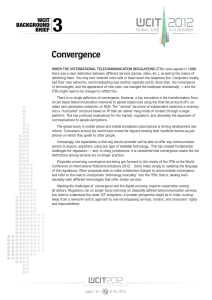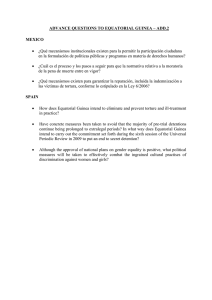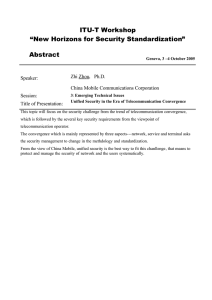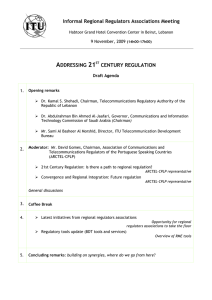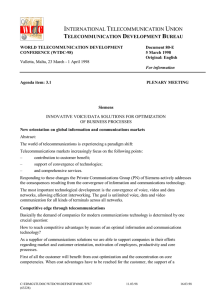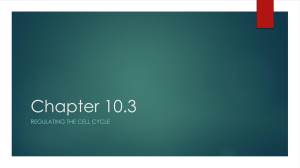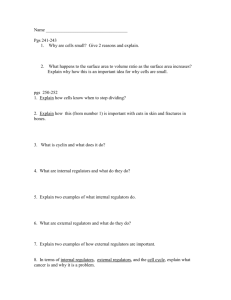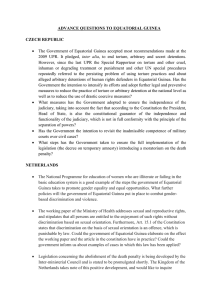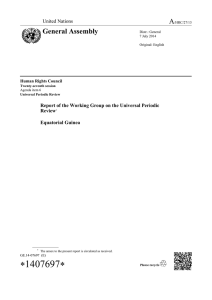ORTEL (Regulatory Agency for Telecommunications of the Republic of Equatorial... In regard to the GSR-09 consultation, we should like to... our agency.
advertisement
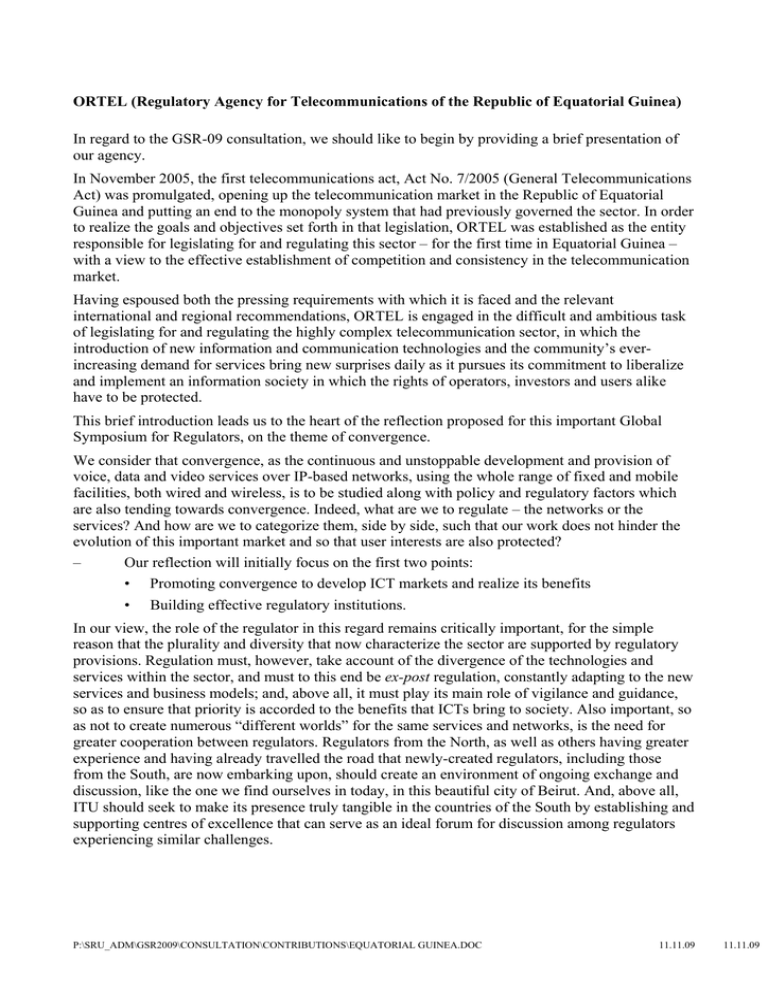
ORTEL (Regulatory Agency for Telecommunications of the Republic of Equatorial Guinea) In regard to the GSR-09 consultation, we should like to begin by providing a brief presentation of our agency. In November 2005, the first telecommunications act, Act No. 7/2005 (General Telecommunications Act) was promulgated, opening up the telecommunication market in the Republic of Equatorial Guinea and putting an end to the monopoly system that had previously governed the sector. In order to realize the goals and objectives set forth in that legislation, ORTEL was established as the entity responsible for legislating for and regulating this sector – for the first time in Equatorial Guinea – with a view to the effective establishment of competition and consistency in the telecommunication market. Having espoused both the pressing requirements with which it is faced and the relevant international and regional recommendations, ORTEL is engaged in the difficult and ambitious task of legislating for and regulating the highly complex telecommunication sector, in which the introduction of new information and communication technologies and the community’s everincreasing demand for services bring new surprises daily as it pursues its commitment to liberalize and implement an information society in which the rights of operators, investors and users alike have to be protected. This brief introduction leads us to the heart of the reflection proposed for this important Global Symposium for Regulators, on the theme of convergence. We consider that convergence, as the continuous and unstoppable development and provision of voice, data and video services over IP-based networks, using the whole range of fixed and mobile facilities, both wired and wireless, is to be studied along with policy and regulatory factors which are also tending towards convergence. Indeed, what are we to regulate – the networks or the services? And how are we to categorize them, side by side, such that our work does not hinder the evolution of this important market and so that user interests are also protected? – Our reflection will initially focus on the first two points: • Promoting convergence to develop ICT markets and realize its benefits • Building effective regulatory institutions. In our view, the role of the regulator in this regard remains critically important, for the simple reason that the plurality and diversity that now characterize the sector are supported by regulatory provisions. Regulation must, however, take account of the divergence of the technologies and services within the sector, and must to this end be ex-post regulation, constantly adapting to the new services and business models; and, above all, it must play its main role of vigilance and guidance, so as to ensure that priority is accorded to the benefits that ICTs bring to society. Also important, so as not to create numerous “different worlds” for the same services and networks, is the need for greater cooperation between regulators. Regulators from the North, as well as others having greater experience and having already travelled the road that newly-created regulators, including those from the South, are now embarking upon, should create an environment of ongoing exchange and discussion, like the one we find ourselves in today, in this beautiful city of Beirut. And, above all, ITU should seek to make its presence truly tangible in the countries of the South by establishing and supporting centres of excellence that can serve as an ideal forum for discussion among regulators experiencing similar challenges. P:\SRU_ADM\GSR2009\CONSULTATION\CONTRIBUTIONS\EQUATORIAL GUINEA.DOC 11.11.09 11.11.09 -2- – We hold the same position in regard to the last two points, inasmuch as regulatory tools should be focused on ensuring that ICTs are used for the benefit of humanity, with the necessary inputs to bring about a reduction in the differences that exist between North and South, between the better-off and the less privileged. Convergence and new technologies can help to expedite the achievement of universal service objectives, greater competition and increasingly varied services under the best conditions for users, thereby contributing in particular to countries’ development, productivity and competitiveness. Governments and regulators must therefore strive for great efficiency in developing norms and regulations for market development, user protection, enhanced quality of service, management of the resources required to guarantee competition, tariff regulation in a multiservice environment, technological neutrality, etc. All of which makes the role of the regulator both vital and essential. Beirut, 10 November 2009 Rufino-OVONO ONDO ENGONGA Technical Director, ORTEL Tel.: (+240) 52 30 85 E-mail: rufino.ovono@gmail.com P:\SRU_ADM\GSR2009\CONSULTATION\CONTRIBUTIONS\EQUATORIAL GUINEA.DOC 11.11.09 11.11.09
